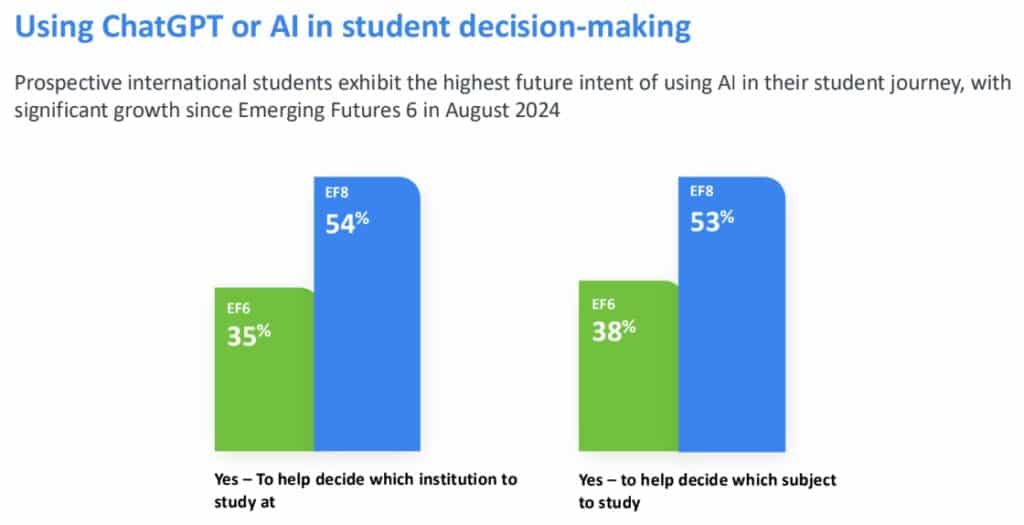Growing use of AI for study abroad decisions highlights importance of multi-channel marketing strategies
- The latest Emerging Futures research from IDP shows rapid adoption of AI for university and programme searches by students considering study abroad
- More than half of prospective students plan to use AI tools such as ChatGPT and Gemini for this purpose
- At the same time, IDP as well as EAB research continues to find that students trust human sources of information and in-person events
- An AI prompt may start a student’s research about where and what to study, but students turn to sources they trust more after that stage of their decision-making process
Findings from IDP’s latest Emerging Futures: Voice of the International Student survey reveal students’ rapidly growing interest in using AI to research destinations, institutions, and programmes.
The survey sampled 7,900 current and prospective students around the world in July and August of 2025.
At the same time as students gravitate to AI inputs to inform decision-making, research by US education consultancy EAB highlights the continued relevance of a multi-channel marketing and recruitment strategy that prioritises (1) the content and design of institutional website and (2) supporting agents with accurate, real-time information about programmes, deadlines, requirements, applications, visa guidelines, and more.
Over half intend to use ChatGPT for study abroad decisions
More than half of surveyed prospective students plan to use ChatGPT to decide which institution to study at (54%) and in which programme (53%). This is up considerably from last year, when 35% of prospects surveyed in August 2024 planned to use AI for institution selection and 38% intended to determine which subject to choose.

Source: IDP's Emerging Futures 8
The research also found that 85% of prospective students are seriously considering more than one study destination.
Simon Emmett, chief partnerships officer at IDP Education, commented on the implications of the findings: “While students are still turning to counsellors and universities for advice, many are telling us that AI is becoming part of their decision-making toolkit. As a result, AI is shaping the early stage of students’ journeys.”
AI as the first step, but not the only one
The growing proportion of students who are using AI tools for study abroad research is changing the role of education agents. In the past, it was common for a student to walk into an agent’s office with a vague sense of where and what they might want to study and an expectation that agents would fill in their knowledge gaps and guide their decision-making process. This is still happening, but to a lesser extent.
Vaishali Jain, a senior education counsellor at IDP Education, said she is already noticing a change in the knowledge base of students – and adjusting accordingly:
“We’re seeing a growing number of students using AI tools like ChatGPT to explore study options before they even speak to a counsellor. AI is helping students clarify their interests, compare institutions, and come to us with more focused questions, while still having the support and guidance of counsellors to keep them on track until the visa has been granted. When used thoughtfully, it helps students take more control of their learning journey."
IDP asked a student for their perspective. Ishika Malik, who is currently in a psychology programme at Swinburne University of Technology in Australia, said:
“When you’re making such a big decision it can be hard to know where to begin. By asking questions that mattered to me, AI helped me narrow down my options and understand what was possible. That made it much easier to have meaningful conversations with counsellors and finalise my application when the time was right.”
In other words, students still value agents’ insights and guidance, but they are increasingly seeking agents' services later in the decision-making process and with different expectations than in the past.
Students consider AI results with caution
Beyond the IDP survey, other recent research shows that most students understand that they cannot automatically trust AI responses to their questions. This has important implications for institutions and agents, since there is still significant student demand for information and guidance provided outside of AI.
For example, education consulting firm EAB's 2025 Student Communication Preferences survey of more than 20,000 high-school students in the US found that AI chatbots such as ChatGPT or Gemini were trusted the least of all information sources about an institution. The top three resources trusted by students were:
- In-person events (e.g., campus tours, college fairs, information sessions) – 34%
- Online resources (e.g., specific college websites, college search data) – 30%
- High-school resources (e.g., teachers, coaches, counsellors) – 26%
AI chatbots came last in the list of 11 options students were asked to consider (3%).
The EAB survey findings highlight that in-person events and human advice remain the most valued sources of information for students deciding on where to study. IDP’s Simon Emmett concurs with the perspective that AI is not a replacement for other channels used by students in their research. He notes that the latest iteration of Emerging Futures found significant reliance on agents/counsellors and university websites:
“Despite the growing intent to engage AI, more than a third of students told us counsellors are among their most trusted sources of advice, and over half still rely on university websites. The role of counsellors and educators remains vital, especially when it comes to making final decisions, navigating applications, and building the confidence to take the leap.”
Implications for agent-institution partnerships
The IDP research suggests that agents’ value is shifting more to:
- Truth-proofing the results of students’ AI research;
- Offering a more authoritative source of information based on deep, real-time knowledge of institution and programme benefits;
- Liaising with institutions on the shortlist to inform them about how students are evaluating their offer versus that of competitors;
- Supporting students in terms of visa applications and processes and preparing them for study abroad.
For agents to fulfill that ability to deliver authoritative, real-time information, they need institutions to provide them with accurate, compelling facts about what is offered in terms of programmes, requirements, deadlines, etc. Regular updates and check-in calls have never been more important for productive agent-institution relationships.
For additional background, please see:
















